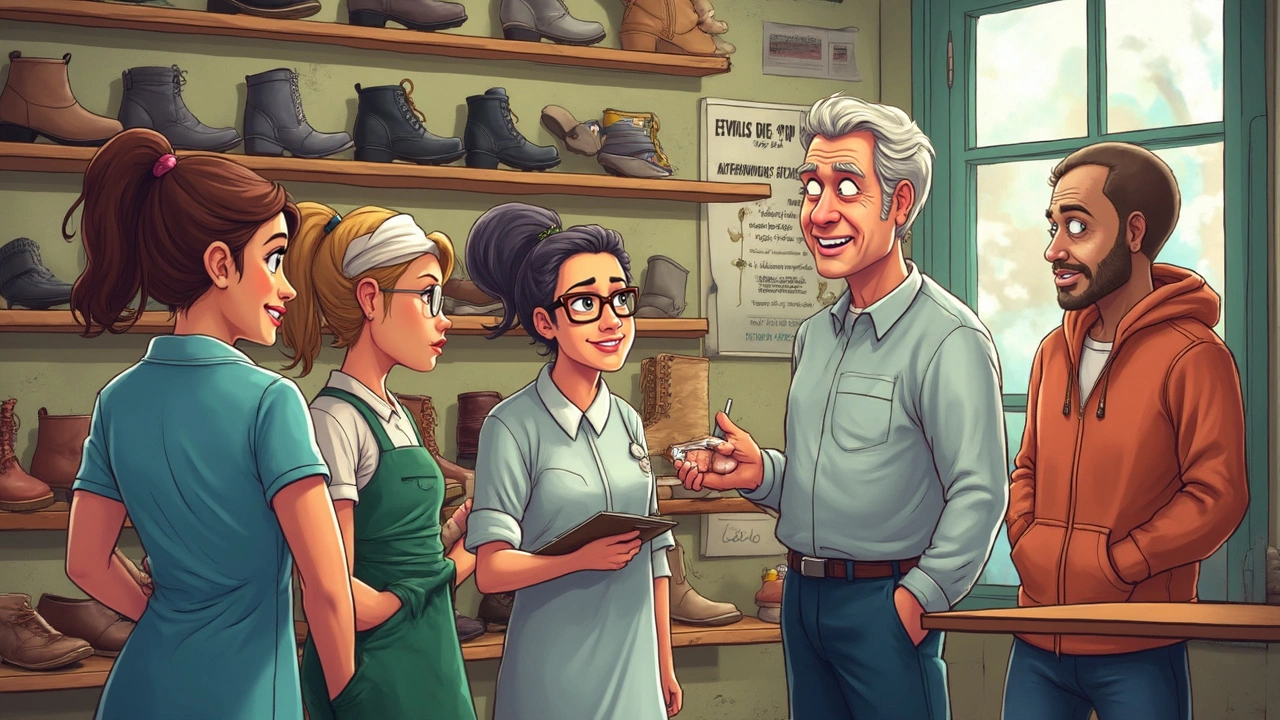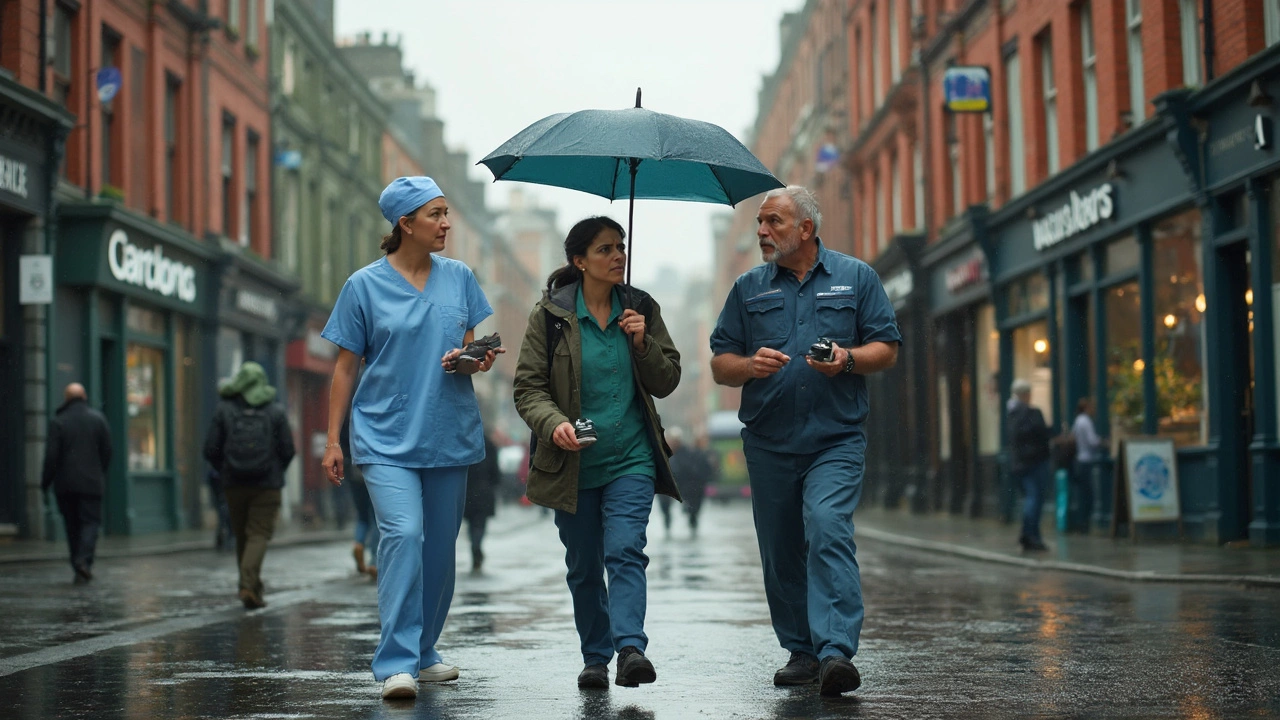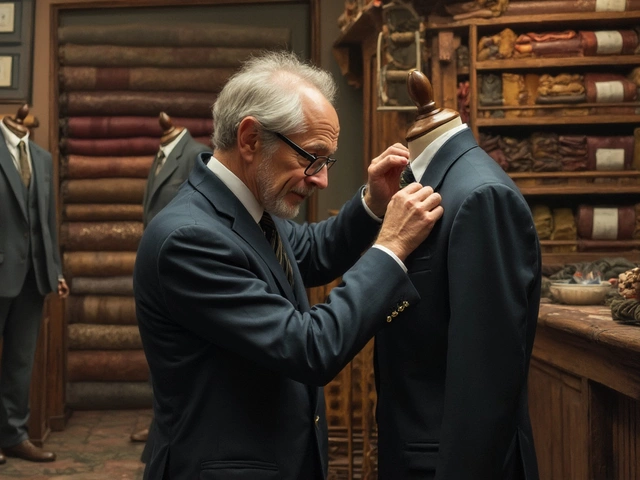If you walk through Grafton Street or hustle around Limerick’s city centre, you'll spot loads of people wearing Skechers. They’re a go-to for everything from school runs to supermarket trips. But when it comes to long shifts in a busy Galway hospital or clocking in hours at an Irish hospitality job, podiatrists rarely tell you to slip on Skechers as your work shoes. Ever wondered why?
The reality is, foot health here in Ireland isn’t just about soft soles or a light feel. With our mix of rainy weather, wet paths, cobbled streets, and nonstop standing in retail or healthcare, what’s under your feet plays a huge part in avoiding bunions, plantar fasciitis, or that stiff, aching heel feeling at the end of a shift. Podiatrists—those folks at clinics like Foot Solutions or independent practices in Cork—see the same problems over and over. They notice patterns with people wearing popular brands, especially Skechers, at work for hours every day.
- The Irish Work Scene and Choosing Shoes
- Inside Skechers: Why Comfort Isn't Always Enough
- What Podiatrists in Ireland Are Actually Saying
- Finding the Right Shoes: Irish Picks and Tips
The Irish Work Scene and Choosing Shoes
The way we work in Ireland is a big deal when it comes to picking the right shoes. Think about it—nurses at the Mater Hospital in Dublin do 12-hour shifts, retail staff in the Crescent Shopping Centre in Limerick are on their feet all day, and tradespeople from Cork to Donegal face wet, uneven ground thanks to our famously unpredictable weather. Most Irish jobs that keep you moving or standing for long stretches need work shoes Ireland specialists would sign off on.
A recent Health and Safety Authority survey showed that nearly 62% of Irish workers are on their feet for five or more hours a day. That’s a serious load for your legs, especially if your shoes aren't built for it. Slippery tiles, worn pavements, and rushing to catch the 46A bus all put different pressures on your feet than a short walk around the park does. The wrong shoes aren't just uncomfortable—they can trigger long-lasting problems.
If you’re picking shoes for work in Ireland, keep in mind:
- Grip matters: Ireland is wet most months, so non-slip soles are key. Tiles, wet leaves, or damp floors at work can turn risky fast with the wrong pair.
- Support is crucial: Jobs in healthcare, retail, or hospitality almost always mean long hours upright, so your arches, heels, and ankles need solid support.
- Local dress codes: Office workers in places like Dublin’s IFSC business district blend comfort with a smart look. In contrast, folks working in Centra or SuperValu usually need black shoes, often with strict safety requirements.
Irish podiatrists get it; they point out how regularly they see foot problems due to soft, unsupportive shoes on the job. The right work shoes aren't just about avoiding blisters on Grafton Street. It’s about dodging injuries, feeling good at the end of a long day, and keeping up with life outside of work too.
Inside Skechers: Why Comfort Isn't Always Enough
Everyone loves that super soft, cloud-like feeling when first slipping on Skechers. In Ireland, it’s tempting to wear them on the job, thinking cushy equals healthy. But podiatrists flag some real issues when it comes to using them as proper work shoes Ireland—especially for long-term, daily use.
The main issue? Most Skechers, especially the popular Memory Foam styles, focus on instant comfort instead of solid support. Memory foam looks fancy, but after a few weeks of pounding pavements in Dublin or standing long hours behind a hotel counter in Killarney, it compresses and loses its structure. That’s when problems start cropping up because your feet aren't getting the proper stability, and your body feels the impact.
Skechers often have very flexible soles. While flexibility sounds good, it can mean less arch support. With so many Irish jobs needing flat, hard or uneven ground—think supermarket workers at Dunnes or teachers on busy school corridors—a lack of support leads to achy feet and sore backs. You’ll hear podiatrists in Irish clinics say these shoes don’t protect against common work injuries like plantar fasciitis, shin splints, or Achilles tendon pain.
Waterproofing's another miss. Most Skechers are made for casual wear, not for soggy Irish footpaths or rainy commutes from Bray to the city. Wet shoes plus hours on your feet? That’s a recipe for blisters and more serious foot issues.
- Durability: Skechers tend to wear out fast—particularly the insole support flattens, and the outer sole loses grip. This can become slippery, which isn’t ideal on busy hospital floors or rainy pavements.
- Support: The built-in arch support is minimal compared to shoes designed for Irish workplaces with lots of standing or walking. That means your muscles and joints are working overtime, not the shoe.
- Slip resistance: Many Irish employers in catering or healthcare need anti-slip soles on work shoes. Not all Skechers meet these standards, making them less suitable legally and physically.
| Feature | Typical Skechers | Work Shoes Approved for Irish Workplaces |
|---|---|---|
| Arch Support | Low | Medium–High |
| Durability | 6–12 months | 12+ months |
| Slip Resistance | Varying | Required Standard |
| Water Resistance | Low | High |
If you’re working on your feet and thinking comfortable trainers must be enough, podiatrists here want to bust that myth. Comfort’s a good start, but if the shoe sacrifices structure and support, you’ll pay for it in the long run—sometimes literally limping home after a shift in Cork or Galway.

What Podiatrists in Ireland Are Actually Saying
If you hear most podiatrists talk about work shoes in Ireland, there's a clear pattern: Skechers might feel nice at first, but they’re not built for the long haul in busy Irish jobs. The issue isn’t about bashing a brand; it’s about genuine concern for people who are on their feet eight hours a day—nurses, shopworkers, teachers, even delivery drivers weaving through Dublin traffic.
Ask the staff at a practice like Foot Focus in Cork, or check the advice from the Irish Chiropodists/Podiatrists Organisation, and you’ll notice a few things come up again and again:
- Skechers often lack the right arch support, especially for people dealing with high arches or flat feet.
- The overly soft foam can break down quick, meaning less shock absorption over time—bad news for knees, heels, and lower back.
- The wide, loose fit can lead to rubbing and slipping inside the shoe, causing blisters or even trips and falls on wet Irish pavements.
- Many Skechers models are designed for general comfort, not real support—something Irish workplace safety officers point out for people exposed to slippery or uneven surfaces.
Dr. Eoin Flynn, a well-known Dublin podiatrist, once put it simply in a Sunday Business Post interview:
“Skechers are grand for light walking, but when it comes to all-day wear in work, you need shoes that hold your foot in place and actually support your arch. Otherwise, you’ll end up in my clinic with pain.”
What’s also important? Irish podiatrists see a spike in foot complaints after the Christmas retail rush or long summer shifts at tourist hotspots like the Cliffs of Moher Visitor Centre. Many patients with heel pain or sore backs will say, “Sure, I didn’t think there was any harm—I was only wearing Skechers!” The reality is, that lack of structure adds up, especially with the unpredictable weather and hard pavements in cities like Cork and Waterford.
Foot clinics around Ireland often track the most common complaints. Here’s a quick look at what they see in people wearing soft, unsupportive work shoes:
| Common Issue | % of Patients Reporting (2024) |
|---|---|
| Heel or Arch Pain | 45% |
| Lower Back Pain | 28% |
| Blisters & Calluses | 22% |
| Trips/Falls on Wet Ground | 10% |
So, when your local podiatrist suggests a sturdier brand—Ecco, Clarks, or even Irish brand Dubarry—it’s not just preference. It’s what keeps real people working pain-free, and it saves a few unnecessary trips to the podiatrist’s chair, too.
Finding the Right Shoes: Irish Picks and Tips
When you’re looking for work shoes in Ireland, the choices can get overwhelming. Whether you’re working in a busy Dublin shop, a Cork clinic, or running deliveries along the Wild Atlantic Way, you need something made for the job—not just for style or quick comfort. Here’s what actually matters.
- Support matters more than squishiness. Go for shoes with proper arch support and a decent heel counter. This means your shoe won’t collapse at the back and will give your foot actual structure. Irish podiatrists always point out that many Skechers models are too soft—a recipe for tired, sore feet by the end of the day.
- Slip resistance isn’t just handy, it’s essential. Irish floors get slippery, especially with all our rain. Look for shoes that actually say ‘slip-resistant’ (restaurants and hospital workers usually know this rule inside out).
- Room in the toes. Don’t force your feet into narrow or pointy shoes. A wide toe box can stop blisters and black toenails, which are shockingly common from hours on the move.
- Breathable but waterproof works best. With unpredictable Irish weather, feet tend to sweat if it’s too warm or soak if it rains. Some brands use Gore-Tex linings which let your foot breathe but keep the rain out – Browse local chains like Intersport Elverys or try Ecco’s work range for this feature.
Irish podiatrists are often big fans of brands like Ecco, New Balance, and Clarks for daily work shoes. Ecco, for instance, offers work shoes that tick all the boxes: robust support, wide fits, and non-slip soles. New Balance is popular for those needing extra width or specialist insoles. Clarks, although a bit old-school, remains a steady favourite for anyone needing smart, comfortable shoes—especially in offices or schools.
If you’re spending cash on new shoes, get fitted in person—yes, even if you usually shop online. Irish shoe shops often measure both feet because size can change (especially after pregnancy or injury) and you want that proper fit. Ask them about return policies too—nobody wants to get stuck with shoes that only feel bad by the second week.
Another local tip: check out places like The Shoe Suite in Galway or Tony Kealys (especially if you work in healthcare—great for comfy, supportive shoes). Stick to stores where staff understand fitting for long days and offer professional fitting recommendations.
| Popular Irish Work Shoe Brands | Main Features |
|---|---|
| Ecco | Supportive, wide fit, waterproof options |
| New Balance | Great for wide feet, good shock absorption |
| Clarks | Office-appropriate, durable, reliable fit |
Last thing—don’t forget about insoles. Well-made removable insoles (the kind you can get moulded at a podiatrist or picked up in Sport Direct) can sometimes turn a half-decent shoe into the perfect fit for Irish workplaces. If you need orthotics, avoid shoes that are too shallow or have weak support, since they’ll just swallow your insoles whole and make everything wobbly.





